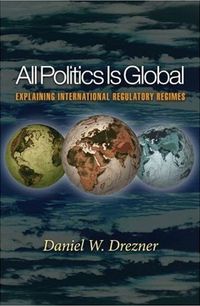

Purchase
Explaining International Regulatory Regimes
Princeton University Press
March 2007
On Sale: March 15, 2007
254 pages
ISBN: 0691096414
EAN: 9780691096414
Hardcover
Add to Wish List
Non-Fiction
Has globalization diluted the power of national governments
to regulate their own economies? Are international
governmental and nongovernmental organizations weakening the
hold of nation-states on global regulatory agendas? Many
observers think so. But in All Politics Is Global, Daniel
Drezner argues that this view is wrong. Despite
globalization, states--especially the great powers--still
dominate international regulatory regimes, and the
regulatory goals of states are driven by their domestic
interests. As Drezner shows, state size still matters. The great
powers--the United States and the European Union--remain the
key players in writing global regulations, and their power
is due to the size of their internal economic markets. If
they agree, there will be effective global governance. If
they don't agree, governance will be fragmented or
ineffective. And, paradoxically, the most powerful sources
of great-power preferences are the least globalized elements
of their economies. Testing this revisionist model of global regulatory
governance on an unusually wide variety of cases, including
the Internet, finance, genetically modified organisms, and
intellectual property rights, Drezner shows why there is
such disparity in the strength of international regulations.
Comments
No comments posted.
Registered users may leave comments.
Log in or register now!
| 


 © 2003-2025 off-the-edge.net
all rights reserved Privacy Policy
© 2003-2025 off-the-edge.net
all rights reserved Privacy Policy